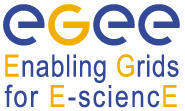CeBIT Open Source Project Lounge -- EGEE
EGEE - Enabling Grids for EsciencE
ByEGEE is among the 15 projects that will present their work at CeBIT. Initiated by the European Union, the project has created a worlwide infrastructure of computing clusters.

In a nutshell - how would you describe your project in a few words?
EGEE has built a worldwide infrastructure of computing clusters in which currently around 150,000 CPU cores in 260 computer centers run over 330,000 programs daily. Almost all systems run under Scientific Linux, their interaction coordinated through gLite open source middleware.
When did the project begin?
The EU project Enabling Grids for E-sciencE (EGEE) began its work May of 2004. It is supported by the various research work of the European Data Grid project that got its start in 2002.
How many active members does the project have?
In development and infrastructure operations, as well as work on the associated grid middleware, more than 9,000 man-months have been invested over the two years of the current project phase. There are 14,000 registered users worldwide.
How did the project come about?
The EGEE initiative emerged out of the recognition that the processing of huge amounts of data from the various scientific research branches requires a distributed, coordinated working and commonly usable computing infrastructure. In this way the experiments at the Large Hadron Collider in Geneva alone produce between 10 and 40 Petabytes of data, which needs to be accessible at any moment by many thousands of researchers who require the applicable computing resources at hand for their repeated operations. The European Union invested significant resources in creating and maintaining the infrastructure and software environment.
What would make a CeBIT visitor interested in your booth?
The EGEE infrastructure is seen today by many as the "real existing" grid. A visit to our booth would provide insight into how this grid functions and the applications that are relevant for such an environment.
Who do you make your software for?
The software is primarily used for scientific research, but is provided free under Apache licensing for any interested party.
Where do you see your biggest current challenge?
It seems necessary for the successful further development of the gLite middleware that a broad user and developer community apart from core users from the scientific realm are involved.
If you were to hire a full-time project developer now, what problem should he or she be ready to solve?
To disseminate the concepts implemented in gLite based on the demands of the established scientific user community.
Under which license is the software currently offered?
Apache License, version 2.0.
Internet adress: http://www.eu-egee.org (see also http://gridportal.hep.ph.ic.ac.uk/rtm).
Subscribe to our Linux Newsletters
Find Linux and Open Source Jobs
Subscribe to our ADMIN Newsletters
Support Our Work
Linux Magazine content is made possible with support from readers like you. Please consider contributing when you’ve found an article to be beneficial.

News
-
Keep Android Open
Google has announced that, soon, anyone looking to develop Android apps will have to first register centrally with Google.
-
Kernel 7.0 Now in Testing
Linus Torvalds has announced the first Release Candidate (RC) for the 7.x kernel is available for those who want to test it.
-
Introducing matrixOS, an Immutable Gentoo-Based Linux Distro
It was only a matter of time before a developer decided one of the most challenging Linux distributions needed to be immutable.
-
Chaos Comes to KDE in KaOS
KaOS devs are making a major change to the distribution, and it all comes down to one system.
-
New Linux Botnet Discovered
The SSHStalker botnet uses IRC C2 to control systems via legacy Linux kernel exploits.
-
The Next Linux Kernel Turns 7.0
Linus Torvalds has announced that after Linux kernel 6.19, we'll finally reach the 7.0 iteration stage.
-
Linux From Scratch Drops SysVinit Support
LFS will no longer support SysVinit.
-
LibreOffice 26.2 Now Available
With new features, improvements, and bug fixes, LibreOffice 26.2 delivers a modern, polished office suite without compromise.
-
Linux Kernel Project Releases Project Continuity Document
What happens to Linux when there's no Linus? It's a question many of us have asked over the years, and it seems it's also on the minds of the Linux kernel project.
-
Mecha Systems Introduces Linux Handheld
Mecha Systems has revealed its Mecha Comet, a new handheld computer powered by – you guessed it – Linux.
